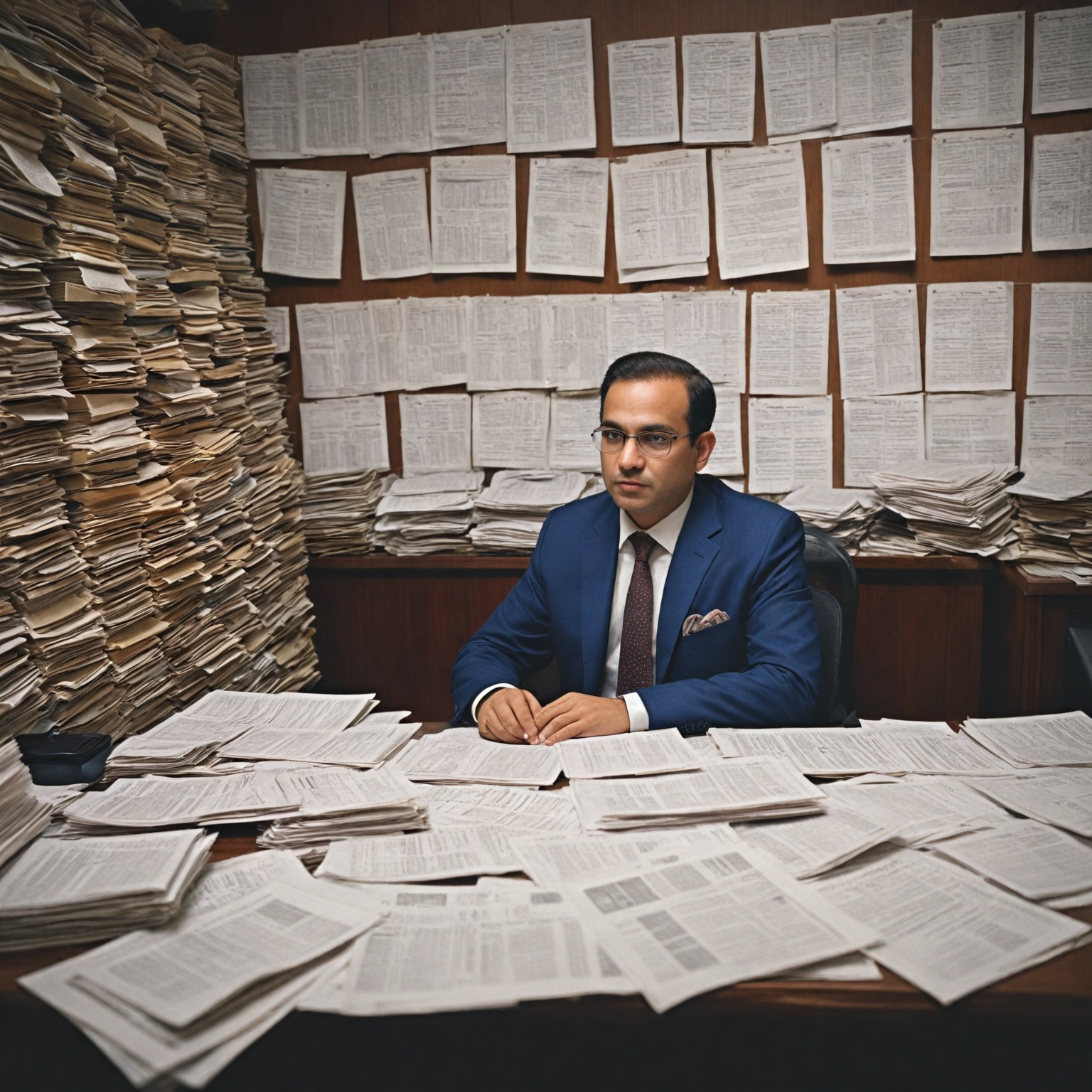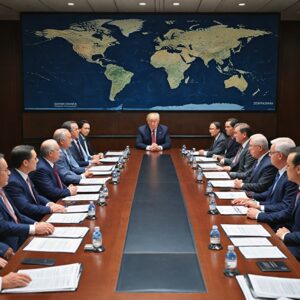Summary
Nehal Modi is an Indian businessman and the younger brother of Nirav Modi, a fugitive diamantaire implicated in one of India’s largest financial scandals—the Punjab National Bank (PNB) fraud case. Nehal has been accused of playing a pivotal role in facilitating and concealing the embezzlement of approximately ₹13,000 crore (about US$1.4 billion) from PNB through a complex web of shell companies and offshore transactions. His involvement reportedly included laundering illicit funds, destroying evidence, and intimidating company directors to maintain a façade of legitimacy for fraudulent trade activities linked to Nirav Modi’s enterprises.
Born into a prominent business family with deep roots in the diamond and industrial sectors, Nehal Modi operated primarily out of Antwerp, Belgium, and had executive roles in firms connected to Nirav Modi’s ventures. The Modi family’s extensive international network has been scrutinized for alleged use of fraudulent Letters of Undertaking (LoUs) issued by PNB’s Brady House branch in Mumbai, enabling the wrongful obtaining of buyer’s credit from foreign banks. Indian investigative agencies, including the Central Bureau of Investigation (CBI) and the Enforcement Directorate (ED), have charged Nehal Modi under money laundering and criminal conspiracy laws, underscoring his integral role in the scam.
Nehal Modi was arrested in the United States following a joint extradition request by Indian authorities, and as of 2025, he remains in custody awaiting a critical extradition hearing scheduled for July 17, 2025. The case has drawn international attention not only for the scale of the fraud but also due to controversies surrounding the destruction and concealment of evidence, which Nehal Modi is alleged to have orchestrated in Dubai and other jurisdictions to impede investigations. US prosecutors have indicated their intention to oppose bail, reflecting the gravity of the charges and the complex legal battle ahead.
The Modi family’s scandal has sparked widespread media coverage and public discourse concerning corruption, governance, and accountability in India’s banking sector. The unfolding legal proceedings against Nehal Modi, alongside those against Nirav Modi and their uncle Mehul Choksi, continue to highlight the challenges of prosecuting high-profile financial crimes with cross-border dimensions.
Early Life and Background
Nirav Modi was born in Palanpur, Gujarat, into a family with a longstanding involvement in the diamond business. He spent part of his childhood in Antwerp, Belgium, a global hub for diamond trading, which likely influenced his future career path. At the age of 19, Nirav Modi moved to Mumbai with his father, Deepak Modi, to work alongside his uncle, Mehul Choksi, further embedding himself in the family’s diamond enterprise.
Nirav Modi’s family background includes Ami Modi, a US citizen by birth, who managed the “Nirav Modi Scholarship for Excellence,” a philanthropic initiative supporting around 250 students annually. Nirav and Ami Modi have three children—two daughters and one son—reflecting a family-oriented personal life amidst his business ventures.
In contrast, Narendra Modi, the Prime Minister of India, was born on September 17, 1950, in Vadnagar, Gujarat, into a lower-middle-class family. His upbringing was marked by simplicity and hard work, with a particularly close bond to his mother, Heeraben Modi, who had a profound influence on his values and character. Narendra Modi began his political journey with the Rashtriya Swayamsevak Sangh (RSS) in the early 1970s, shaping his ideological and political foundations.
Family Business Background
Nehal Modi hails from a prominent business family with deep roots in India’s industrial and commercial sectors. The Modi Group, originally founded by Gujarmal Modi (1902–1976), evolved from a small family-run enterprise into one of India’s largest conglomerates by the mid-20th century. Starting in 1933, the group expanded to include a diverse range of companies such as Modi Sugar, Modi Vanaspati Manufacturing Company, Modi Industries Ltd, Modi Rubber, Modi Paints, Modi Oils, Modi Electrodes, and many others spanning industries from textiles and chemicals to steel and industrial gases. Under Gujarmal Modi’s leadership and later with the involvement of his brother Kedar Nath Modi, the Modi Group became the seventh largest conglomerate in India, significantly influencing the development of Modinagar, a city named after the family business.
Today, the Modi Group is a US $2.8 billion conglomerate headquartered in New Delhi, comprising companies like Godfrey Phillips India, Indofil Industries Ltd., and Modicare Limited. Its business portfolio remains highly diversified, including cigarette manufacturing, education, agricultural chemicals, personal care, tea and beverages, entertainment, consumer products, multi-level marketing, and gourmet restaurants.
Nehal Modi himself has been primarily engaged in the luxury diamond and jewellery trade, operating mainly out of Antwerp, Belgium, with business interests in Europe and the United States. He has also held executive positions in firms connected to his brother Nirav Modi’s ventures, such as Firestar International. However, the family’s business dealings have not been without controversy, as some members were allegedly involved in setting up shell companies across Dubai and Hong Kong, purportedly for export-import activities tied to Nirav Modi’s firms, including Diamonds R Us, Solar Exports, and Stellar Diamonds.
The Modi family’s extensive business network and their impact on Indian industry underscore the complex background from which Nehal Modi emerged, combining a legacy of industrial entrepreneurship with more recent controversies linked to international business practices.
Relationship with Nirav Modi
Nehal Modi is the younger brother of Nirav Modi, the fugitive Indian businessman accused in the Punjab National Bank (PNB) fraud case. Both brothers are central figures in the multi-crore financial scandal that has attracted international attention. While Nirav Modi is alleged to have orchestrated the large-scale embezzlement of ₹6,498 crore from PNB through his companies, Nehal Modi is accused of facilitating the laundering of the illicit proceeds on behalf of Nirav. Investigations reveal that Nehal used a complex network of shell companies and offshore transactions to conceal and transfer the proceeds of crime, effectively aiding his brother’s operations.
Their familial and business ties extend deeply into the diamond industry, with their family having operated in this sector for several generations. Nirav Modi was born in Palanpur, Gujarat, and later moved to Mumbai with his father to work alongside their uncle, Mehul Choksi, another key accused in the case. This close-knit family business background underscores the intertwined nature of their alleged criminal activities. The Indian government, through agencies such as the Enforcement Directorate (ED) and the Central Bureau of Investigation (CBI), has pursued extradition efforts against both brothers, highlighting Nehal Modi’s integral role in the fraud and money laundering operations connected to Nirav Modi.
Alleged Involvement in Punjab National Bank Fraud
Nehal Modi has been identified as a key accused in the massive Punjab National Bank (PNB) fraud case, which involved fraudulent Letters of Undertaking (LoUs) worth approximately ₹13,000 crore (about US$1.4 billion) issued by the PNB Brady House branch in Mumbai. The scam, carried out between 2014 and 2017, was orchestrated by jeweller and designer Nirav Modi, his brother Nehal Modi, and their maternal uncle Mehul Choksi, among others.
According to the Central Bureau of Investigation (CBI) charge-sheet, Nehal Modi, through various companies under his control, siphoned off nearly ₹6,498 crore from the bank by fraudulently obtaining LoUs. Meanwhile, Mehul Choksi employed similar methods to misappropriate the remaining amount of the total fraud. Nehal Modi is also accused of destroying evidence and aiding Nirav Modi in evading detection after the scam was exposed.
Further investigations revealed that Nehal, along with Nirav Modi’s close confidante Mihir R Bhansali, was involved in transporting 50 kg of gold and substantial amounts of cash from Dubai following the scam’s discovery. The CBI also alleged that Nehal Modi coerced nine of Nirav Modi’s employees into traveling to Egypt against their will, where they were forced to sign documents falsely naming them as owners of dummy companies floated by Nirav Modi. These shell companies, based in Dubai and Hong Kong, were used to create the illusion of legitimate export-import business transactions involving firms such as Diamonds R Us, Solar Exports, and Stellar Diamonds.
The elaborate use of these shell companies was intended to legitimize the fraudulent trade dealings, with Nehal Modi reportedly threatening and pressuring company directors in Dubai to maintain the facade of legality. The scam is considered one of the largest banking frauds in India’s history, and Nehal Modi’s alleged role highlights his central position within the criminal enterprise orchestrated by the Modi family members and their associates.
Charges and Legal Allegations
Nehal Modi, aged 46, has been taken into custody in the United States, with extradition proceedings currently underway at the request of Indian authorities. The charges against him primarily include one count of money laundering under Section 3 of the Prevention of Money Laundering Act (PMLA), 2002, and one count of criminal conspiracy under Sections 120-B and 201 of the Indian Penal Code (IPC).
The allegations stem from Nehal Modi’s alleged involvement in a ₹13,000 crore bank fraud, considered one of the largest in India’s history, involving the Punjab National Bank. He is accused of conspiring to facilitate and conceal the fraudulent activities through an international network of entities. Specifically, he is said to have aided in the transfer and concealment of proceeds of crime, thereby violating Indian financial laws.
Additionally, a supplementary chargesheet filed by the Central Bureau of Investigation (CBI) identifies Nehal Modi as ‘accused number 27’ for destroying evidence in Dubai. The CBI has stated that he intimidated directors of Dubai-based shell companies used by Nirav Modi to create a facade of legitimacy for the fraudulent trade activities. These acts fall under the charge of causing disappearance of evidence as per Section 201 of the IPC.
The joint extradition plea filed by the Enforcement Directorate (ED) and the CBI underscores these charges, highlighting Nehal Modi’s alleged role in the criminal conspiracy and money laundering operations linked to the Punjab National Bank scam.
Arrest and Extradition Proceedings
Nehal Modi, the younger brother of fugitive diamantaire Nirav Modi, was arrested by US authorities in response to a joint extradition plea filed by the Enforcement Directorate (ED) and the Central Bureau of Investigation (CBI) of India. The arrest was made following charges related to one of India’s largest bank frauds involving the Punjab National Bank (PNB), estimated at ₹13,000 crore.
US prosecutors are pursuing Nehal Modi’s extradition on two principal charges: one count of money laundering under Section 3 of the Prevention of Money Laundering Act (PMLA), 2002, and another for criminal conspiracy under Sections 120-B and 201 of the Indian Penal Code (IPC), which pertain to conspiracy and causing the disappearance of evidence, respectively. According to the complaint, Nehal Modi is accused of facilitating the concealment and transfer of proceeds of crime through a complex international network of shell companies. These entities falsely portrayed genuine export-import business dealings with three of Nirav Modi’s firms—Diamonds R Us, Solar Exports, and Stellar Diamonds—and wrongfully obtained buyer’s credit from foreign banks using counterfeit Letters of Undertaking (LoUs) issued fraudulently by PNB’s Brady House branch in Mumbai, with collusion from bank insiders.
The CBI has identified Nehal Modi as ‘accused number 27’ in a supplementary chargesheet, accusing him of destroying evidence in Dubai. Further investigations suggest that he intimidated directors of Dubai-based shell companies that Nirav Modi used to give a veneer of legitimacy to the fraudulent transactions. Nehal’s brother Nirav Modi is currently facing extradition proceedings in the United Kingdom.
The extradition hearing for Nehal Modi is scheduled for July 17, 2025. During this session, he may apply for bail; however, US prosecutors have already stated their intention to oppose any such application. US officials have kept Indian authorities informed about Nehal Modi’s custody status and ongoing extradition proceedings.
Missing and Destroyed Evidence Controversy
Nehal Modi, brother of Nirav Modi, has been a central figure in the controversy surrounding the destruction and concealment of evidence related to the Punjab National Bank (PNB) fraud case. He has been formally designated as ‘accused number 27’ in a supplementary chargesheet submitted by the Central Bureau of Investigation (CBI), primarily for his alleged role in destroying evidence in Dubai. According to the CBI, Nehal Modi intimidated directors of Dubai-based shell companies that were used by Nirav Modi to create a façade of legitimate business transactions, thereby facilitating the fraudulent trade.
Investigations reveal that these shell companies were falsely presented as genuine export-import businesses connected to three Nirav Modi firms—Diamonds R Us, Solar Exports, and Stellar Diamonds. These entities wrongfully obtained buyer’s credit from foreign banks through fake Letters of Undertaking (LoUs) fraudulently issued by PNB’s Brady House branch in Mumbai, with assistance from bank insiders. In addition to intimidation, Nehal Modi is alleged to have orchestrated the movement of employees and dummy directors from Dubai to Cairo to prevent their return to India for questioning.
The Enforcement Directorate (ED) has further accused Nehal Modi of personally overseeing the elimination of accounts and records critical to the investigation. He is also alleged to have shifted documents in an attempt to evade Indian authorities. These actions form part of broader laundering and post-scam asset concealment operations detailed in the ED’s chargesheet.
The legal proceedings against Nehal Modi extend beyond Indian jurisdiction. US prosecutors, in support of an extradition request, have filed charges against him under Section 3 of the Prevention of Money Laundering Act (PMLA), 2002, and Sections 120-B (criminal conspiracy) and 201 (causing disappearance of evidence) of the Indian Penal Code (IPC). The extradition case highlights his role in concealing and transferring proceeds of the ₹13,000 crore bank fraud through an international network of entities. The next hearing in his extradition case is scheduled for July 17, 2025, during which Nehal Modi may seek bail; however, US prosecutors have indicated their intention to oppose such a request.
The joint efforts of Indian agencies, including the CBI and ED, alongside cooperation with US officials, have been instrumental in compiling the evidence that links Nehal Modi to the destruction of crucial evidence and the broader conspiracy in the PNB fraud case. His detention and ongoing extradition proceedings underscore the complex international dimensions of this high-profile financial crime.
Money Laundering Methods and Cross-Border Transactions
Nehal Modi is alleged to have played a crucial role in laundering criminal proceeds on behalf of his brother, Nirav Modi, who is currently incarcerated in London and contesting extradition to India. According to Indian authorities, Nehal assisted in concealing and transferring large amounts of illicit funds through a complex network of shell companies and offshore accounts. These shell companies were used to mask the origin and movement of the illegal money, facilitating the laundering process across multiple jurisdictions.
Investigators have revealed that employees of Nirav Modi’s firms were forced to relocate from Dubai to Cairo, where their electronic devices—including phones, laptops, and servers—were deliberately destroyed to eliminate incriminating evidence. Furthermore, these employees were coerced into signing false declarations claiming ownership of Dubai and Hong Kong-based companies. These entities were presented as genuine exporters and importers engaged in business with Nirav Modi’s firms such as Diamonds R Us, Solar Exports, and Stellar Diamonds. This elaborate setup allowed the shell companies to wrongfully receive buyer’s credit from foreign banks, which was backed by fraudulent Letters of Undertaking (LoUs) issued by Punjab National Bank’s Brady House branch in Mumbai, with the
Related Legal Proceedings and Associated Individuals
Nehal Modi, brother of fugitive businessman Nirav Modi, has been a central figure in the investigations surrounding the Punjab National Bank (PNB) fraud case. Indian enforcement agencies, including the Enforcement Directorate (ED) and the Central Bureau of Investigation (CBI), have jointly compiled extensive evidence implicating Nehal Modi in money laundering and concealment of assets obtained through the scam.
The charges against Nehal Modi primarily include violations under Section 3 of the Prevention of Money Laundering Act (PMLA), 2002, and Sections 120-B and 201 of the Indian Penal Code (IPC), relating to criminal conspiracy and destruction of evidence. He is accused of orchestrating the transfer and concealment of illicit funds via a complex network of shell companies and overseas transactions, thereby facilitating the laundering of proceeds derived from Nirav Modi’s fraudulent activities.
Investigations reveal that Nirav Modi’s companies embezzled approximately ₹6,498 crore from PNB, with the remainder misappropriated by their uncle, Mehul Choksi, who is also facing legal actions abroad. Nehal Modi is alleged to have played a key role in laundering this money and managing attempts to obstruct the investigation, including flying employees and dummy directors between Dubai and Cairo to evade authorities, and orchestrating the removal and destruction of incriminating documents. The ED has asserted that Nehal “personally oversaw” the elimination of accounts and records pertinent to the case.
Internationally, Nehal Modi’s arrest in the United States followed an extradition request initiated by Indian authorities, with the US cooperating in the custody and ongoing extradition proceedings. This comes after a UK court ordered the extradition of Nirav Modi, who is currently imprisoned in London and facing similar charges. Additionally, the International Criminal Police Organization (Interpol) issued a Red Corner Notice against Nehal Modi in 2020, requesting member countries to detain him if located, underscoring the global dimension of the investigation.
Alongside Nirav Modi and Mehul Choksi, Nehal Modi remains a pivotal individual in the sprawling PNB scam investigations, with multiple legal proceedings unfolding internationally to bring all accused to justice.
Media Coverage and Public Response
The arrest of Nehal Modi in the United States has drawn significant media attention, highlighting the intricate details of the fraud case involving Nirav Modi and the extensive use of shell companies across Dubai and Hong Kong. Media outlets have extensively covered allegations that Nehal Modi played a crucial role in concealing illicit funds and destroying evidence, which has intensified public scrutiny and interest in the case.
Coverage has particularly focused on the legal proceedings, including the upcoming extradition hearing scheduled for July 17, 2025, which has been widely reported as a critical moment for the case. The possibility of Nehal applying for bail during this hearing has also attracted attention, with U.S. prosecutors signaling their opposition to bail, further fueling media speculation about the outcome and implications of the trial.
Public response has been mixed, with some segments expressing outrage over the alleged corruption and the misuse of financial systems, while others have raised concerns about the broader impact on India’s reputation and governance. The case has also been discussed in the context of the Modi government’s approach to judiciary matters, where critics argue that political and ideological considerations influence legal outcomes, potentially affecting the impartiality of judicial processes in high-profile cases.
Current Status and Recent Developments
Nehal Modi, brother of Nirav Modi, is currently in custody in the United States as extradition proceedings initiated by Indian authorities continue. The US officials have formally informed their Indian counterparts of his detention, and the extradition process is underway based on charges including money laundering under Section 3 of the Prevention of Money Laundering Act (PMLA), 2002, and criminal conspiracy under Sections 120-B and 201 of the Indian Penal Code.
Following the rejection of all his bail requests, Nehal Modi remains lodged in jail. In December 2022, he lost his final appeal against the extradition request filed by Indian agencies, solidifying the legal basis for his transfer to India. A status conference is scheduled for July 17, 2025, when the next hearing will take place. During this hearing, Nehal Modi may seek bail; however, US prosecutors have already indicated their intent to oppose any such application.
The charges against Nehal Modi also involve his alleged role in intimidating directors of Dubai-based shell companies that were used by Nirav Modi to lend legitimacy to a fraudulent trade scheme. According to a supplementary chargesheet submitted by the Central Bureau of Investigation (CBI), Nehal Modi is identified as ‘accused number 27’ for destroying evidence in Dubai related to this fraud. These shell companies were implicated in securing wrongful buyer’s credit from foreign banks through fake Letters of Undertaking (LoUs) issued fraudulently by Punjab National Bank’s Brady House branch in Mumbai, aided by insiders.
The legal proceedings, including appeals such as THE STATE OF UTTAR PRADESH VS. BHEEM SINGH and BIJAY VS. RITU, are ongoing, with diary numbers indicating active case files as of mid-2025. The forthcoming hearing in July is pivotal for the progression of the extradition and related judicial processes.
The content is provided by Sierra Knightley, Fact-Nest













